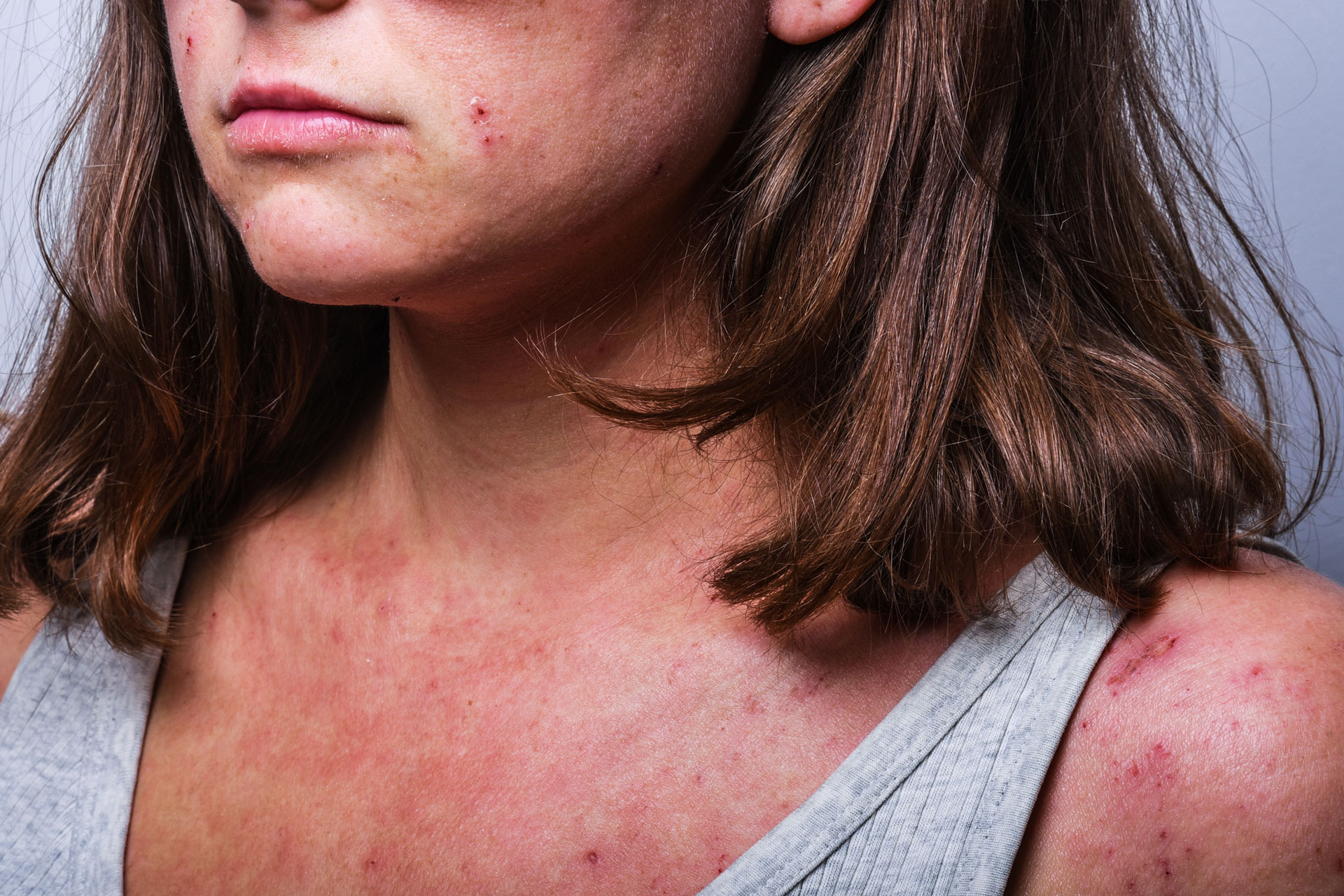Type I Allergy (IgE-mediated Immediate-type Allergy)
IgE-mediated Immediate-type Reaction
Immediate-type allergies (Type I allergies) refer to hypersensitivity reactions that typically occur within the first hour after contact with the triggering allergen and are mediated by IgE-type antibodies. The laboratory detection of specific IgE antibodies serves to confirm sensitisation and to identify the allergen responsible for the allergic reaction. Depending on the organ affected by contact with the allergen, immediate-type allergies (Type I) can present with a wide range of clinical manifestations.
Food Allergies
A food allergy is typically an early allergic reaction (Type I allergy), the course of which can vary greatly. The range of triggered reactions spans from local acute symptoms in the gastrointestinal tract such as:
- Vomiting
- Nausea
- Diarrhoea
- Abdominal pain
- Constipation and bloating
To:
- Skin reactions (e.g. urticaria, worsening of eczema in cases of neurodermatitis)
- Severe systemic reactions such as anaphylactic shock, which can be fatal
In childhood, the most common allergies are to:
- Cow’s milk
- Hen’s egg
- Peanut
- Wheat
- Soya
In adults, the most common allergies are to:
- Nuts
- Fish
- Soya
- Wheat
- Celery
- Seafood
Hay Fever and Allergic Asthma
Allergic immediate-type conditions affecting the mucous membranes of the respiratory tract are triggered by inhalation contact with airborne allergens (aeroallergens). IgE antibodies against inhalant allergens can be detected in nearly 34% of adults in Germany. Symptoms primarily affect the conjunctival, nasal, and bronchial mucosa.
Typical symptoms in response to contact with inhalant allergens include:
- Coughing
- Shortness of breath
- Wheezing (bronchial hyperreactivity)
- Sudden episodes of breathlessness due to bronchial asthma (narrowing of the bronchi)
- Complaints such as a runny nose and sneezing
- Watery and burning eyes
Allergic rhinitis is caused by an IgE-mediated inflammatory immune response following allergen exposure in the nasal mucosa. It is mainly triggered by aeroallergens such as pollen, animal dander, mould spores, and house dust. In pollen-induced rhinoconjunctivitis (hay fever), symptoms like itching, swelling and redness of the nasal mucosa, increased nasal secretion, and a foreign body sensation in the eyes associated with excessive tearing are most prominent. In terms of general well-being, symptoms such as fatigue, sleep disturbances, and exhaustion often accompany rhinitis/rhinoconjunctivitis.
Bronchial asthma is a chronic inflammatory disease of the airways, which is characterised by sudden, reversible narrowing of the bronchi. The release of allergic inflammatory mediators in the lungs following allergen contact triggers an acute reaction, which leads to the classic triad in the pathophysiology of bronchial asthma:
- Spasm of the bronchial muscles
- Mucosal oedema
- Hypersecretion of thick mucus (dyscrinia)
Neurodermatitis Increases the Likelihood of Developing Allergies
Neurodermatitis, also referred to as atopic eczema or atopic dermatitis, is the most common inflammatory skin disease. It manifests in around half of all patients within the first six months of life, in 60% of cases during the first year, and in over 70 to 85% before the age of five. By early adulthood, the majority of affected children are symptom-free. The clinical presentation of neurodermatitis varies depending on severity and age and ranges from mild eczema with skin redness to severe, sometimes weeping skin lesions with blistering, crust formation, or thickening of the skin (lichenification). The underlying cause is a disrupted skin barrier function. It results in increased moisture loss through the epidermis, which leads to dry skin.
As a consequence, irritating substances and environmental allergens can more easily penetrate into deeper layers of the skin, which triggers inflammation as a defensive response by the immune system.
Neurodermatitis on the face of a young woman
Classical Diagnosis of Type I Allergies – Detection of Allergen-specific IgE
A thorough and comprehensive compilation of the patient’s medical history forms the cornerstone of diagnosing an allergic condition. If the medical history suggests the existence of an IgE-mediated immediate-type allergy, serological confirmation of sensitisation by means of elevated titres of allergen-specific IgE (sIgE) is indicated. In classical in vitro IgE diagnostics, the reactivity of sIgE antibodies to whole allergen extracts is measured (e.g. laboratory request: IgE hazelnut). If the result of the sIgE determination is positive, the clinical relevance of the sensitisation must be confirmed by conducting further tests. These may be carried out directly on the patient (in vivo) or by means of a laboratory-based diagnostic procedure (in vitro):
In vivo
- Skin provocation test (prick test, intradermal test)
- Sting provocation (in the case of Hymenoptera venom allergy)
- Oral provocation (in the case of food allergies)
- Elimination diet (in the case of food allergies)
In vitro
- Basophil Activation Test (BAT)
Principle of the Basophil Activation Test (BAT):
The Basophil Activation Test (BAT) is used in vitro to assess the clinical relevance of an allergen-specific sensitisation, which can be identified by elevated sIgE titres. It measures the reactivity of basophils from the patient’s blood after stimulation with the relevant allergen. Activation of basophils is considered equivalent to a clinical reaction upon allergen exposure in the patient.
Allergen sources (e.g. hazelnut, pollen) typically contain several allergenically relevant proteins, each of which may vary in clinical significance for an individual patient’s sensitisation. Within the scope of molecular or component-resolved IgE diagnostics, recombinant individual allergens are used to detect IgE reactivity (e.g. laboratory request: rCor a 1 (PR-10 protein), rCor a 8 (LTP), rCor a 9 (storage protein), rCor a 14 (storage protein)). This method enables a well-founded risk assessment of clinical relevance and an estimation of the potential severity of any allergic reaction that may occur.



